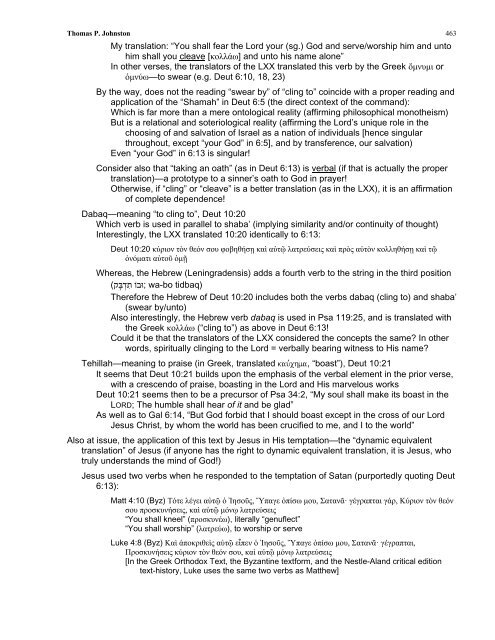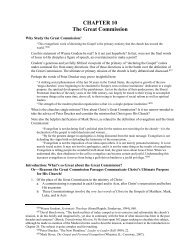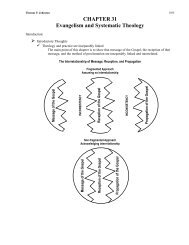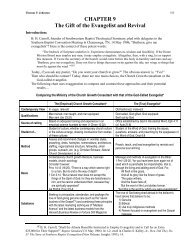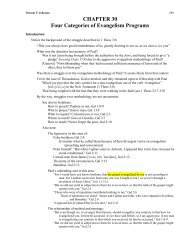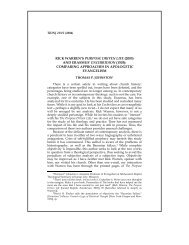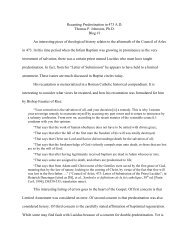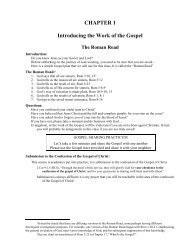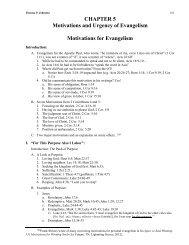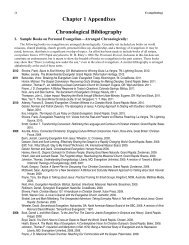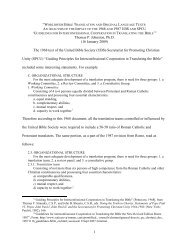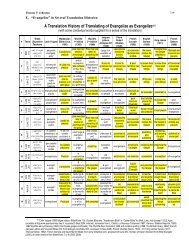CHAPTER 7 Defining Evangelizing - Evangelism Unlimited
CHAPTER 7 Defining Evangelizing - Evangelism Unlimited
CHAPTER 7 Defining Evangelizing - Evangelism Unlimited
Create successful ePaper yourself
Turn your PDF publications into a flip-book with our unique Google optimized e-Paper software.
Thomas P. Johnston 463<br />
My translation: “You shall fear the Lord your (sg.) God and serve/worship him and unto<br />
him shall you cleave [κολλάω] and unto his name alone”<br />
In other verses, the translators of the LXX translated this verb by the Greek ὄμνυμι or<br />
ὀμνύω—to swear (e.g. Deut 6:10, 18, 23)<br />
By the way, does not the reading “swear by” of “cling to” coincide with a proper reading and<br />
application of the “Shamah” in Deut 6:5 (the direct context of the command):<br />
Which is far more than a mere ontological reality (affirming philosophical monotheism)<br />
But is a relational and soteriological reality (affirming the Lord’s unique role in the<br />
choosing of and salvation of Israel as a nation of individuals [hence singular<br />
throughout, except “your God” in 6:5], and by transference, our salvation)<br />
Even “your God” in 6:13 is singular!<br />
Consider also that “taking an oath” (as in Deut 6:13) is verbal (if that is actually the proper<br />
translation)—a prototype to a sinner’s oath to God in prayer!<br />
Otherwise, if “cling” or “cleave” is a better translation (as in the LXX), it is an affirmation<br />
of complete dependence!<br />
Dabaq—meaning “to cling to”, Deut 10:20<br />
Which verb is used in parallel to shaba’ (implying similarity and/or continuity of thought)<br />
Interestingly, the LXX translated 10:20 identically to 6:13:<br />
Deut 10:20 κύριον τὸν θεόν σου φοβηθήσῃ καὶ αὐτῷ λατρεύσεις καὶ πρὸς αὐτὸν κολληθήσῃ καὶ τῷ<br />
ὀνόματι αὐτοῦ ὀμῇ<br />
Whereas, the Hebrew (Leningradensis) adds a fourth verb to the string in the third position<br />
(ק ָבּד ְת<br />
ִ וֹבוּ; wa-bo tidbaq)<br />
Therefore the Hebrew of Deut 10:20 includes both the verbs dabaq (cling to) and shaba’<br />
(swear by/unto)<br />
Also interestingly, the Hebrew verb dabaq is used in Psa 119:25, and is translated with<br />
the Greek κολλάω (“cling to”) as above in Deut 6:13!<br />
Could it be that the translators of the LXX considered the concepts the same? In other<br />
words, spiritually clinging to the Lord = verbally bearing witness to His name?<br />
Tehillah—meaning to praise (in Greek, translated kau,chma, “boast”), Deut 10:21<br />
It seems that Deut 10:21 builds upon the emphasis of the verbal element in the prior verse,<br />
with a crescendo of praise, boasting in the Lord and His marvelous works<br />
Deut 10:21 seems then to be a precursor of Psa 34:2, “My soul shall make its boast in the<br />
LORD; The humble shall hear of it and be glad”<br />
As well as to Gal 6:14, “But God forbid that I should boast except in the cross of our Lord<br />
Jesus Christ, by whom the world has been crucified to me, and I to the world”<br />
Also at issue, the application of this text by Jesus in His temptation—the “dynamic equivalent<br />
translation” of Jesus (if anyone has the right to dynamic equivalent translation, it is Jesus, who<br />
truly understands the mind of God!)<br />
Jesus used two verbs when he responded to the temptation of Satan (purportedly quoting Deut<br />
6:13):<br />
Matt 4:10 (Byz) Τότε λέγει αὐτῷ ὁ Ἰησοῦς, Ὕπαγε ὀπίσω μου, Σατανᾶ· γέγραπται γάρ, Κύριον τὸν θεόν<br />
σου προσκυνήσεις, καὶ αὐτῷ μόνῳ λατρεύσεις<br />
“You shall kneel” (προσκυνέω), literally “genuflect”<br />
“You shall worship” (λατρεύω), to worship or serve<br />
Luke 4:8 (Byz) Καὶ ἀποκριθεὶς αὐτῷ εἶπεν ὁ Ἰησοῦς, Ὕπαγε ὀπίσω μου, Σατανᾶ· γέγραπται,<br />
Προσκυνήσεις κύριον τὸν θεόν σου, καὶ αὐτῷ μόνῳ λατρεύσεις<br />
[In the Greek Orthodox Text, the Byzantine textform, and the Nestle-Aland critical edition<br />
text-history, Luke uses the same two verbs as Matthew]


